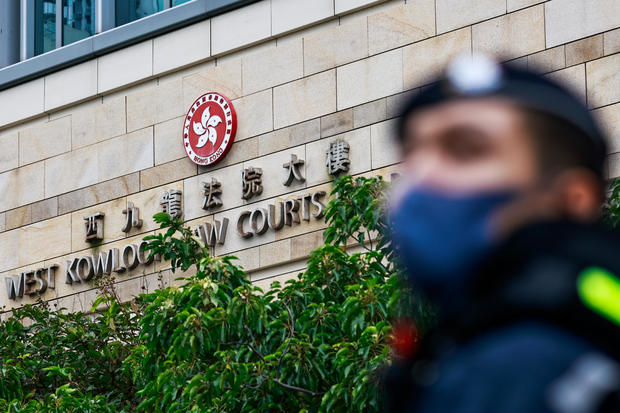
Hong Kong’s jailing of 45 democracy activists sparks criticism from foreign governments, rights groups
Forty-five prominent activists in Hong Kong were sentenced to jail for up to 10 years on Tuesday, sparking criticism from foreign governments and rights groups. Beijing defended the decisions.
The democracy advocates were among 47 people charged under a Beijing-imposed national security law in 2021 for their involvement in an unofficial primary election to pick opposition candidates. In the city’s biggest national security case to date, they were accused of agreeing to veto government-proposed budgets after potentially securing a legislative majority to force a dissolution of the legislature and the ouster of the city’s leader.
The case involved pro-democracy figures. Thirty-one of them pleaded guilty to conspiracy to commit subversion. Fourteen others were convicted following a long trial. Two were acquitted.
Lin Jian said no one should be allowed to use democracy as a pretext to engage in unlawful activities and escape justice. Lin said certain Western countries ignored that they maintain their own national security through judicial procedures while unreasonably criticizing Hong Kong courts for “fairly implementing” the security law.
Daniel Ceng/Anadolu via Getty Images
“This severely violates and tramples on the spirit of the rule of law,” he said at a news briefing.
He said Beijing firmly opposes what he described as certain Western countries’ interference in China’s internal affairs and their attempts to smear Hong Kong’s rule of law.
The European Union called the sentencing “another unprecedented blow” against the city’s fundamental freedoms, democratic participation and pluralism.
The bloc said in a statement that its members are deeply concerned about the politically motivated prosecution of people engaging in peaceful political activity. It said such activities should be legitimate in any political system that respects basic democratic principles.
Hong Kong leader John Lee said the activists’ plan was to undermine, destroy or overthrow the city’s political system.
The government said the case was handled strictly in accordance with the law.
Hong Kong Security Minister Chris Tang said the sentences reflect the severity of the offenses. Tang said national security helps safeguard the city’s prosperity, so his government takes any violations of the law seriously.
“Different people may have different judgments about whether the sentencing is appropriate. But I think the important point is the rule of law,” he said in a news briefing.
Taiwan presidential office spokesperson Karen Kuo said democracy is not a crime and condemned the Chinese government for using what she called unjust procedures to suppress the political participation and freedom of speech of Hong Kong pro-democracy figures.
The sentencing “not only breaks the promises of ’50 years unchanged’ and ‘high degree of autonomy,’ but further proves that ‘one country, two systems’ is unfeasible,” she said in a statement.
When Hong Kong returned from British to Chinese rule in 1997, Beijing promised to retain its Western-style civil liberties for 50 years under the governing principle of “one country, two systems.”
Jeremy Laurence, spokesperson for the Office of the U.N. High Commissioner for Human Rights, said he is gravely concerned by the use of the security law to criminalize conduct protected by the human rights to freedom of expression, peaceful assembly and association.
“We will continue to engage with the Chinese authorities as we have done in the past,” he said.
The State Department said it “strongly” condemned the sentences and called on Hong Kong authorities to “immediately and unconditionally release the 45 individuals and similarly detained political prisoners.”
“These harsh sentences erode confidence in Hong Kong’s judicial system and harm the city’s international reputation,” said spokesperson Matthew Miller on Tuesday.
The department said it plans to “impose new visa restrictions on multiple Hong Kong officials responsible for implementing” the security law.
The U.S. Consulate in Hong Kong said the defendants were aggressively prosecuted and jailed for participating in normal political activity protected under the city’s mini-constitution, and called for their immediate release.
In Washington, D.C., the chairs of the bipartisan Congressional-Executive Commission said the sentences violate international law and called for wide condemnation. Rep. Chris Smith, a New Jersey Republican, and Sen. Jeff Merkley, a Democrat from Oregon, asked the Biden administration to sanction judges and prosecutors responsible for “undermining democracy and human rights in Hong Kong.”
“These politically motivated prosecutions are occurring at the same time that dozens of U.S. CEOs are being wined and dined by Hong Kong officials and urged to invest in Hong Kong,” the lawmakers said. “Each of these U.S. financial titans should be asked whether the Hong Kong government’s mass detentions of political prisoners and regular bulldozing of the rule of law undermine the city’s attractiveness as an international commercial and financial center.”
Hong Kong’s last British governor, Chris Patten, said in a statement the sentencing was “not only an affront to the people of Hong Kong, but those who value rights and freedoms around the world.”
He condemned the “sham” sentences and urged the British government not to allow the results of the case to go unnoticed. He said the activists were an integral part of the city’s pro-democracy movement.
Amnesty International China director Sarah Brooks said the people convicted in the “politically motivated” case should not spend even a day in jail.
“None of the 45 people sentenced have committed an internationally recognized crime; they have been jailed only for exercising their human rights,” she said.
Maya Wang, associate China director at Human Rights Watch, said, “Running in an election and trying to win it is now a crime that can lead to a decade in prison in Hong Kong.”
Wang said the harsh sentences reflect how fast Hong Kong’s civil liberties and judicial independence have nosedived in the past four years since the security law was introduced.
Source: cbsnews.com